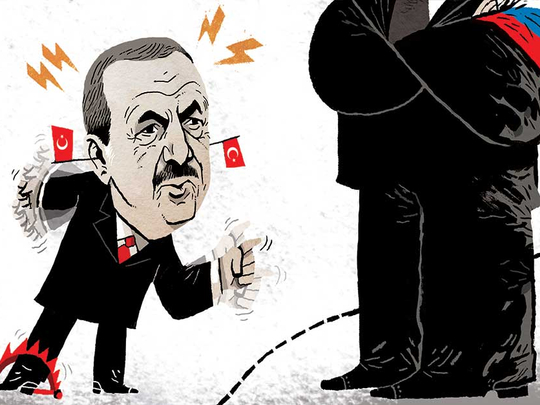
Turkish President Recep Tayyip Erdogan fancies himself a tough guy. He was proud to announce that he was the one who ordered the shooting down of a Russian jet that, by his own account, entered his country’s airspace for 17 seconds. He says the pilot was given ten warnings before his plane was brought down, but neglected to explain how those long garbled warnings were squeezed into such a short space of time.
The surviving Russian navigator denies all charges. “I could see perfectly on the map and on the ground where the border was ... There was no danger of entering Turkey,” he said. He insists no warnings were given, pointing out that the usual procedure in such cases is for planes to be dispatched to fly alongside so as to make eye-to-eye contact with foreign pilots before eviscerating their jets.
Erdogan initially defended his decision. One reason he gave was that Russian planes were bombing his country’s Turkmen brothers — supposed moderate rebels who fired upon the ejecting Russian pilots as they were parachuting down. If so, then why did he claim he didn’t know the offending (clearly marked) jet was Russian? Russia’s President Vladimir Putin calls that explanation “nonsense”. Putin also expressed surprise that within hours of the incident, Erdogan called an emergency meeting of Nato. Putin accused Turkey of planning the attack. He calls it an ambush, which he says was certainly carried out with a green light from the Obama administration.
Certainly the timing of Turkey’s shoot-down is suspect. Coming shortly before the French President Francois Hollande’s visit to Moscow to discuss bilateral military cooperation against Daesh (the self-proclaimed Islamic State of Iraq and the Levant) some pundits believe it may have been a spoiler. If so, it hasn’t worked. Hollande has agreed with his Russian counterpart on the coordination of air strikes in Syria and increased intelligence sharing. Both countries have been targeted by Daesh in recent weeks and are resolved to maintain a united front against the terrorists. According to the Syrian Foreign Minister, Walid Mua’alem, Syria’s President Bashar Al Assad was persuaded by Putin not to retaliate with air power — a wise move preventing an all-out conflagration, given that Nato is obliged to come to the defence of its members. In the event Nato’s response was mild, acknowledging that Ankara had the right to defend its airspace, while urging both sides to work towards de-escalation.
Putin is enraged. He accused the country he believed was a valuable ally of stabbing Russia in the back and being an accomplice to terrorists. He asserts that Turkey facilitates the transport of oil stolen by Daesh through its territory and is itself a customer. Erdogan calls the allegation ‘slander’.
Revenge
Adding grist to ‘the slanderers’ mill, the editor-in-chief of the Cumhuriyet newspaper and one of its bureau chiefs have recently been placed in pretrial detention for publishing details concerning a convoy of trucks carrying weapons destined for Syrian rebels linked to Turkish national intelligence (MIT). Erdogan wants revenge. He has personally called for the editor-in-chief to serve multiple life sentences. Erdogan warns Putin that he’s “playing with fire” even as he’s displaying his desperation to mend fences, bemoaning the fact that the Russian president doesn’t answer his calls and is yet to confirm he’ll meet with him on the sidelines of the climate summit in Paris.
Putin may be a strongman, but he’s no loose cannon. He’s not about to ignite the Third World War with a military response. Instead, he is hitting Turkey where it hurts, in its pocket. Russian tour operators are no longer selling packages to Turkish resorts. Russians have been advised not to visit Turkey and visa-free entry for Turks will be suspended from January 1.
Turkish companies operating in Russia are being raided and closed down for minor infringements of rules and 39 Turkish businessmen have been arrested for entering the country without requisite business visas. Turkish trucks carrying exported goods are being thoroughly inspected and, in many cases, are being sent back. There’s a lot more at stake for Turkey’s economy. Russia’s economy minister, tasked with drawing up potential retaliatory sanctions, is mulling cancelling a planned joint free trade zone, a contract to build a nuclear facility as well as a proposed underwater gas pipeline.
And rather than be deterred from bombing Erdogan’s friends across the border with Syria, Russian jets are pounding Turkmen rebels with renewed ferocity and according to defence experts Russia now rules Syria’s skies, endangering United States-led coalition warplanes with its deployment of a highly sophisticated long-range S-400 missile battery and radar system. Erdogan has gained nothing from his misadventure. Turkey’s already depressed economy is being battered and if Russia — said to provide the country with almost 60 per cent of its gas requirements — turns off the taps, a big freeze could be on the cards in more ways than one.
Putin says he wants an apology. Erdogan has not only refused to apologise, he is demanding an apology from Russia! Given that public sentiment in both countries is rising against the other, it will be interesting to see who will risk his personal popularity by being the first to blink.
Linda S. Heard is an award-winning British political columnist and guest television commentator with a focus on the Middle East.








